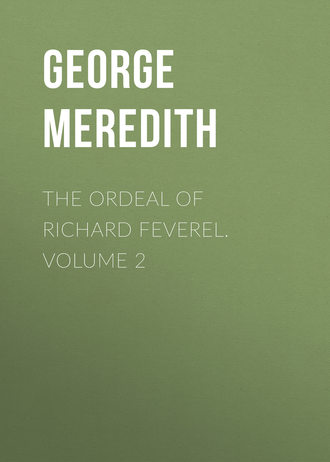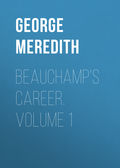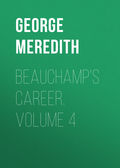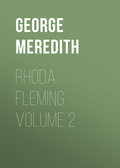
George Meredith
The Ordeal of Richard Feverel. Volume 2
"Which was death to the rhymes," said Adrian. "I saw her this morning.
The boy hasn't bad taste. As you say, she is too good for a farmer.
Such a spark would explode any System. She slightly affected mine. The Huron is stark mad about her."
"But we must positively write and tell his father," said Lady Blandish.
The wise youth did not see why they should exaggerate a trifle. The lady said she would have an interview with Richard, and then write, as it was her duty to do. Adrian shrugged, and was for going into the scientific explanation of Richard's conduct, in which the lady had to discourage him.
"Poor boy!" she sighed. "I am really sorry for him. I hope he will not feel it too strongly. They feel strongly, father and son."
"And select wisely," Adrian added.
"That's another thing," said Lady Blandish.
Their talk was then of the dulness of neighbouring county people, about whom, it seemed, there was little or no scandal afloat: of the lady's loss of the season in town, which she professed not to regret, though she complained of her general weariness: of whether Mr. Morton of Poer Hall would propose to Mrs. Doria, and of the probable despair of the hapless curate of Lobourne; and other gossip, partly in French.
They rounded the lake, and got upon the road through the park to
Lobourne. The moon had risen. The atmosphere was warm and pleasant.
"Quite a lover's night," said Lady Blandish.
"And I, who have none to love pity me!" The wise youth attempted a sigh.
"And never will have," said Lady Blandish, curtly. "You buy your loves."
Adrian protested. However, he did not plead verbally against the impeachment, though the lady's decisive insight astonished him. He began to respect her, relishing her exquisite contempt, and he reflected that widows could be terrible creatures.
He had hoped to be a little sentimental with Lady Blandish, knowing her romantic. This mixture of the harshest common sense and an air of "I know you men," with romance and refined temperament, subdued the wise youth more than a positive accusation supported by witnesses would have done. He looked at the lady. Her face was raised to the moon. She knew nothing—she had simply spoken from the fulness of her human knowledge, and had forgotten her words. Perhaps, after all, her admiration, or whatever feeling it was, for the baronet, was sincere, and really the longing for a virtuous man. Perhaps she had tried the opposite set pretty much. Adrian shrugged. Whenever the wise youth encountered a mental difficulty he instinctively lifted his shoulders to equal altitudes, to show that he had no doubt there was a balance in the case— plenty to be said on both sides, which was the same to him as a definite solution.
At their tryst in the wood, abutting on Raynham Park, wrapped in themselves, piped to by tireless Love, Richard and Lucy sat, toying with eternal moments. How they seem as if they would never end! What mere sparks they are when they have died out! And how in the distance of time they revive, and extend, and glow, and make us think them full the half, and the best of the fire, of our lives!
With the onward flow of intimacy, the two happy lovers ceased to be so shy of common themes, and their speech did not reject all as dross that was not pure gold of emotion.
Lucy was very inquisitive about everything and everybody at Raynham. Whoever had been about Richard since his birth, she must know the history of, and he for a kiss will do her bidding.
Thus goes the tender duet:
"You should know my cousin Austin, Lucy.—Darling! Beloved!"
"My own! Richard!"
"You should know my cousin Austin. You shall know him. He would take to you best of them all, and you to him. He is in the tropics now, looking out a place—it's a secret—for poor English working-men to emigrate to and found a colony in that part of the world:—my white angel!"
"Dear love!"
"He is such a noble fellow! Nobody here understands him but me. Isn't it strange? Since I met you I love him better! That's because I love all that's good and noble better now—Beautiful! I love—I love you!"
"My Richard!"
"What do you think I've determined, Lucy? If my father—but no! my father does love me.—No! he will not; and we will be happy together here. And I will win my way with you. And whatever I win will be yours; for it will be owing to you. I feel as if I had no strength but yours— none! and you make me—O Lucy!"
His voice ebbs. Presently Lucy murmurs—
"Your father, Richard."
"Yes, my father?"
"Dearest Richard! I feel so afraid of him."
"He loves me, and will love you, Lucy."
"But I am so poor and humble, Richard."
"No one I have ever seen is like you, Lucy."
"You think so, because you"—
"What?"
"Love me," comes the blushing whisper, and the duet gives place to dumb variations, performed equally in concert.
It is resumed.
"You are fond of the knights, Lucy. Austin is as brave as any of them.– My own bride! Oh, how I adore you! When you are gone, I could fall upon the grass you tread upon, and kiss it. My breast feels empty of my heart—Lucy! if we lived in those days, I should have been a knight, and have won honour and glory for you. Oh! one can do nothing now. My lady- love! My lady-love!—A tear?—Lucy?"
"Dearest! Ah, Richard! I am not a lady."
"Who dares say that? Not a lady—the angel I love!"
"Think, Richard, who I am."
"My beautiful! I think that God made you, and has given you to me."
Her eyes fill with tears, and, as she lifts them heavenward to thank her God, the light of heaven strikes on them, and she is so radiant in her pure beauty that the limbs of the young man tremble.
"Lucy! O heavenly spirit! Lucy!"
Tenderly her lips part—"I do not weep for sorrow,"
The big bright drops lighten, and roll down, imaged in his soul.
They lean together—shadows of ineffable tenderness playing on their thrilled cheeks and brows.
He lifts her hand, and presses his mouth to it. She has seen little of mankind, but her soul tells her this one is different from others, and at the thought, in her great joy, tears must come fast, or her heart will break—tears of boundless thanksgiving. And he, gazing on those soft, ray-illumined, dark-edged eyes, and the grace of her loose falling tresses, feels a scarce-sufferable holy fire streaming through his members.
It is long ere they speak in open tones.
"O happy day when we met!"
What says the voice of one, the soul of the other echoes.
"O glorious heaven looking down on us!"
Their souls are joined, are made one for evermore beneath that bending benediction.
"O eternity of bliss!"
Then the diviner mood passes, and they drop to earth.
"Lucy! come with me to-night, and look at the place where you are some day to live. Come, and I will row you on the lake. You remember what you said in your letter that you dreamt?—that we were floating over the shadow of the Abbey to the nuns at work by torchlight felling the cypress, and they handed us each a sprig. Why, darling, it was the best omen in the world, their felling the old trees. And you write such lovely letters. So pure and sweet they are. I love the nuns for having taught you."
"Ah, Richard! See! we forget! Ah!" she lifts up her face pleadingly, as to plead against herself, "even if your father forgives my birth, he will not my religion. And, dearest, though I would die for you I cannot change it. It would seem that I was denying God; and—oh! it would make me ashamed of my love."
"Fear nothing!" He winds her about with his arm. "Come! He will love us both, and love you the more for being faithful to your father's creed. You don't know him, Lucy. He seems harsh and stern—he is full of kindness and love. He isn't at all a bigot. And besides, when he hears what the nuns have done for you, won't he thank them, as I do? And—oh! I must speak to him soon, and you must be prepared to see him soon, for I cannot bear your remaining at Belthorpe, like a jewel in a sty. Mind! I'm not saying a word against your uncle. I declare I love everybody and everything that sees you and touches you. Stay! it is a wonder how you could have grown there. But you were not born there, and your father had good blood. Desborough!—here was a Colonel Desborough—never mind! Come!"
She dreads to. She begs not to. She is drawn away.
The woods are silent, and then—
"What think you of that for a pretty pastoral?" says a very different voice.
Adrian reclined against a pine overlooking the fern-covert. Lady Blandish was recumbent upon the brown pine-droppings, gazing through a vista of the lower greenwood which opened out upon the moon-lighted valley, her hands clasped round one knee, her features almost stern in their set hard expression.
They had heard, by involuntarily overhearing about as much as may be heard in such positions, a luminous word or two.
The lady did not answer. A movement among the ferns attracted Adrian, and he stepped down the decline across the pine-roots to behold heavy Benson below; shaking fern-seed and spidery substances off his crumpled skin.
"Is that you, Mr. Hadrian?" called Benson, starting, as he puffed, and exercised his handkerchief.
"Is it you, Benson, who have had the audacity to spy upon these Mysteries?" Adrian called back, and coming close to him, added, "You look as if you had just been well thrashed."
"Isn't it dreadful, sir?" snuffled Benson. "And his father in ignorance,
Mr. Hadrian!"
"He shall know, Benson! He shall know how, you have endangered your valuable skin in his service. If Mr. Richard had found you there just now I wouldn't answer for the consequences."
"Ha!" Benson spitefully retorted. "This won't go on; Mr. Hadrian. It shan't, sir. It will be put a stop to tomorrow, sir. I call it corruption of a young gentleman like him, and harlotry, sir, I call it. I'd have every jade flogged that made a young innocent gentleman go on like that, sir."
"Then, why didn't you stop it yourself, Benson? Ah, I see! you waited— what? This is not the first time you have been attendant on Apollo and Miss Dryope? You have written to headquarters?"
"I did my duty, Mr. Hadrian."
The wise youth returned to Lady Blandish, and informed her of Benson's zeal. The lady's eyes flashed. "I hope Richard will treat him as he deserves," she said.
"Shall we home?" Adrian inquired.
"Do me a favour;" the lady replied. "Get my carriage sent round to meet me at the park-gates."
"Won't you?"—
"I want to be alone."
Adrian bowed and left her. She was still sitting with her hands clasped round one knee, gazing towards the dim ray-strewn valley.
"An odd creature!" muttered the wise youth. "She's as odd as any of them. She ought to be a Feverel. I suppose she's graduating for it. Hang that confounded old ass of a Benson! He has had the impudence to steal a march on me!"
The shadow of the cypress was lessening on the lake. The moon was climbing high. As Richard rowed the boat, Lucy, sang to him softly. She sang first a fresh little French song, reminding him of a day when she had been asked to sing to him before, and he did not care to hear. "Did I live?" he thinks. Then she sang to him a bit of one of those majestic old Gregorian chants, that, wherever you may hear them, seem to build up cathedral walls about you. The young man dropped the sculls. The strange solemn notes gave a religions tone to his love, and wafted him into the knightly ages and the reverential heart of chivalry.
Hanging between two heavens on the lake: floating to her voice: the moon stepping over and through white shoal's of soft high clouds above and below: floating to her void—no other breath abroad! His soul went out of his body as he listened.
They must part. He rows her gently shoreward.
"I never was so happy as to-night," she murmurs.
"Look, my Lucy. The lights of the old place are on the lake. Look where you are to live."
"Which is your room, Richard?"
He points it out to her.
"O Richard! that I were one of the women who wait on you! I should ask nothing more. How happy she must be!"
"My darling angel-love. You shall be happy; but all shall wait on you, and I foremost, Lucy."
"Dearest! may I hope for a letter?"
"By eleven to-morrow. And I?"
"Oh! you will have mine, Richard."
"Tom shall wait far it. A long one, mind! Did you like my last song?"
She pats her hand quietly against her bosom, and he knows where it rests.
O love! O heaven!
They are aroused by the harsh grating of the bow of the boat against the shingle. He jumps out, and lifts her ashore.
"See!" she says, as the blush of his embrace subsides—"See!" and prettily she mimics awe and feels it a little, "the cypress does point towards us. O Richard! it does!"
And he, looking at her rather than at the cypress, delighting in her arch grave ways—
"Why, there's hardly any shadow at all, Lucy. She mustn't dream, my darling! or dream only of me."
"Dearest! but I do."
"To-morrow, Lucy! The letter in the morning, and you at night. O happy to-morrow!"
"You will be sure to be there, Richard?"
"If I am not dead, Lucy."
"O Richard! pray, pray do not speak of that. I shall not survive you."
"Let us pray, Lucy, to die together, when we are to die. Death or life, with you! Who is it yonder? I see some one—is it Tom? It's Adrian!"
"Is it Mr. Harley?" The fair girl shivered.
"How dares he come here!" cried Richard.
The figure of Adrian, instead of advancing, discreetly circled the lake. They were stealing away when he called. His call was repeated. Lucy entreated Richard to go to him; but the young man preferred to summon his attendant, Tom, from within hail, and send him to know what was wanted.
"Will he have seen me? Will he have known me?" whispered Lucy, tremulously.
"And if he does, love?" said Richard.
"Oh! if he does, dearest—I don't know, but I feel such a presentiment.
You have not spoken of him to-night, Richard. Is he good?"
"Good?" Richard clutched her hand for the innocent maiden phrase. "He's very fond of eating; that's all I know of Adrian."
Her hand was at his lips when Tom returned.
"Well, Tom?"
"Mr. Adrian wishes particular to speak to you, sir," said Tom.
"Do go to him, dearest! Do go!" Lucy begs him.
"Oh, how I hate Adrian!" The young man grinds his teeth.
"Do go!" Lucy urges him. "Tom—good Tom—will see me home. To-morrow, dear love! To-morrow!"
"You wish to part from me?"
"Oh, unkind! but you must not come with me now. It may be news of importance, dearest. Think, Richard!"
"Tom! go back!"
At the imperious command the well-drilled Tom strides off a dozen paces, and sees nothing. Then the precious charge is confided to him. A heart is cut in twain.
Richard made his way to Adrian. "What is it you want with me, Adrian?"
"Are we seconds, or principals, O fiery one?" was Adrian's answer.
"I want nothing with you, except to know whether you have seen Benson."
"Where should I see Benson? What do I know of Benson's doings?"
"Of course not—such a secret old fist as he is! I want some one to tell him to order Lady Blandish's carriage to be sent round to the park-gates. I thought he might be round your way over there—I came upon him accidentally just now in Abbey-wood. What's the matter, boy?"
"You saw him there?"
"Hunting Diana, I suppose. He thinks she's not so chaste as they say," continued Adrian. "Are you going to knock down that tree?"
Richard had turned to the cypress, and was tugging at the tough wood. He left it and went to an ash.
"You'll spoil that weeper," Adrian cried. "Down she comes! But good- night, Ricky. If you see Benson mind you tell him."
Doomed Benson following his burly shadow hove in sight on the white road while Adrian spoke. The wise youth chuckled and strolled round the lake, glancing over his shoulder every now and then.
It was not long before he heard a bellow for help—the roar of a dragon in his throes. Adrian placidly sat down on the grass, and fixed his eyes on the water. There, as the roar was being repeated amid horrid resounding echoes, the wise youth mused in this wise—
"'The Fates are Jews with us when they delay a punishment,' says The Pilgrim's Scrip, or words to that effect. The heavens evidently love Benson, seeing that he gets his punishment on the spot. Master Ricky is a peppery young man. He gets it from the apt Gruffudh. I rather believe in race. What a noise that old ruffian makes! He'll require poulticing with The Pilgrim's Scrip. We shall have a message to-morrow, and a hubbub, and perhaps all go to town, which won't be bad for one who's been a prey to all the desires born of dulness. Benson howls: there's life in the old dog yet! He bays the moon. Look at her. She doesn't care. It's the same to her whether we coo like turtle-doves or roar like twenty lions. How complacent she looks! And yet she has dust as much sympathy for Benson as for Cupid. She would smile on if both were being birched. Was that a raven or Benson? He howls no more. It sounds guttural: frog- like—something between the brek-kek-kek and the hoarse raven's croak. The fellow'll be killing him. It's time to go to the rescue. A deliverer gets more honour by coming in at the last gasp than if he forestalled catastrophe.—Ho, there, what's the matter?"
So saying, the wise youth rose, and leisurely trotted to the scene of battle, where stood St. George puffing over the prostrate Dragon.
"Holloa, Ricky! is it you?" said Adrian. "What's this? Whom have we here?—Benson, as I live!"
"Make this beast get up," Richard returned, breathing hard, and shaking his great ash-branch.
"He seems incapable, my dear boy. What have you been up to?—Benson!
Benson!—I say, Ricky, this looks bad."
"He's shamming!" Richard clamoured like a savage. "Spy upon me, will he? I tell you, he's shamming. He hasn't had half enough. Nothing's too bad for a spy. Let him getup!"
"Insatiate youth! do throw away that enormous weapon."
"He has written to my father," Richard shouted. "The miserable spy! Let him get up!"
"Ooogh? I won't!" huskily groaned Benson. "Mr. Hadrian, you're a witness—he's my back!"– Cavernous noises took up the tale of his maltreatment.
"I daresay you love your back better than any part of your body now," Adrian muttered. "Come, Benson! be a man. Mr. Richard has thrown away the stick. Come, and get off home, and let's see the extent of the damage."
"Ooogh! he's a devil! Mr. Hadrian, sir, he's a devil!" groaned Benson, turning half over in the road to ease his aches.
Adrian caught hold of Benson's collar and lifted him to a sitting posture. He then had a glimpse of what his hopeful pupil's hand could do in wrath. The wretched butler's coat was slit and welted; his hat knocked in; his flabby spirit so broken that he started and trembled if his pitiless executioner stirred a foot. Richard stood over him, grasping his great stick; no dawn of mercy for Benson in any corner of his features.
Benson screwed his neck round to look up at him, and immediately gasped, "I won't get up! I won't! He's ready to murder me again!—Mr. Hadrian! if you stand by and see it, you're liable to the law, sir—I won't get up while he's near." No persuasion could induce Benson to try his legs while his executioner stood by.
Adrian took Richard aside: "You've almost killed the poor devil, Ricky.
You must be satisfied with that. Look at his face."
"The coward bobbed while I struck" said Richard. "I marked his back. He ducked. I told him he was getting it worse."
At so civilized piece of savagery, Adrian opened his mouth wide.
"Did you really? I admire that. You told him he was getting it worse?"
Adrian opened his mouth again to shake another roll of laughter out.
"Come," he said, "Excalibur has done his word. Pitch him into the lake. And see—here comes the Blandish. You can't be at it again before a woman. Go and meet her, and tell her the noise was an ox being slaughtered. Or say Argus."
With a whirr that made all Benson's bruises moan and quiver, the great ash-branch shot aloft, and Richard swung off to intercept Lady Blandish.
Adrian got Benson on his feet. The heavy butler was disposed to summon all the commiseration he could feel for his bruised flesh. Every half- step he attempted was like a dislocation. His groans and grunts were frightful.
"How much did that hat cost, Benson?" said Adrian, as he put it on his head.
"A five-and-twenty shilling beaver, Mr. Hadrian!" Benson caressed its injuries.
"The cheapest policy of insurance I remember to have heard of!" said
Adrian.
Benson staggered, moaning at intervals to his cruel comforter.
"He's a devil, Mr. Hadrian! He's a devil, sir, I do believe, sir.
Ooogh! he's a devil!—I can't move, Mr. Hadrian. I must be fetched. And
Dr. Clifford must be sent for, sir. I shall never be fit for work again.
I haven't a sound bone in my body, Mr. Hadrian."
"You see, Benson, this comes of your declaring war upon Venus. I hope the maids will nurse you properly. Let me see: you are friends with the housekeeper, aren't you? All depends upon that."
"I'm only a faithful servant, Mr. Hadrian," the miserable butler snarled.
"Then you've got no friend but your bed. Get to it as quick as possible,
Benson."
"I can't move." Benson made a resolute halt. "I must be fetched," he whinnied. "It's a shame to ask me to move, Mr. Hadrian."
"You will admit that you are heavy, Benson," said Adrian, "so I can't carry you. However, I see Mr. Richard is very kindly returning to help me."
At these words heavy Benson instantly found his legs, and shambled on.
Lady Blandish met Richard in dismay.
"I have been horribly frightened," she said. "Tell me, what was the meaning of those cries I heard?"
"Only some one doing justice on a spy," said Richard, and the lady smiled, and looked on him fondly, and put her hand through his hair.
"Was that all? I should have done it myself if I had been a man. Kiss me."







